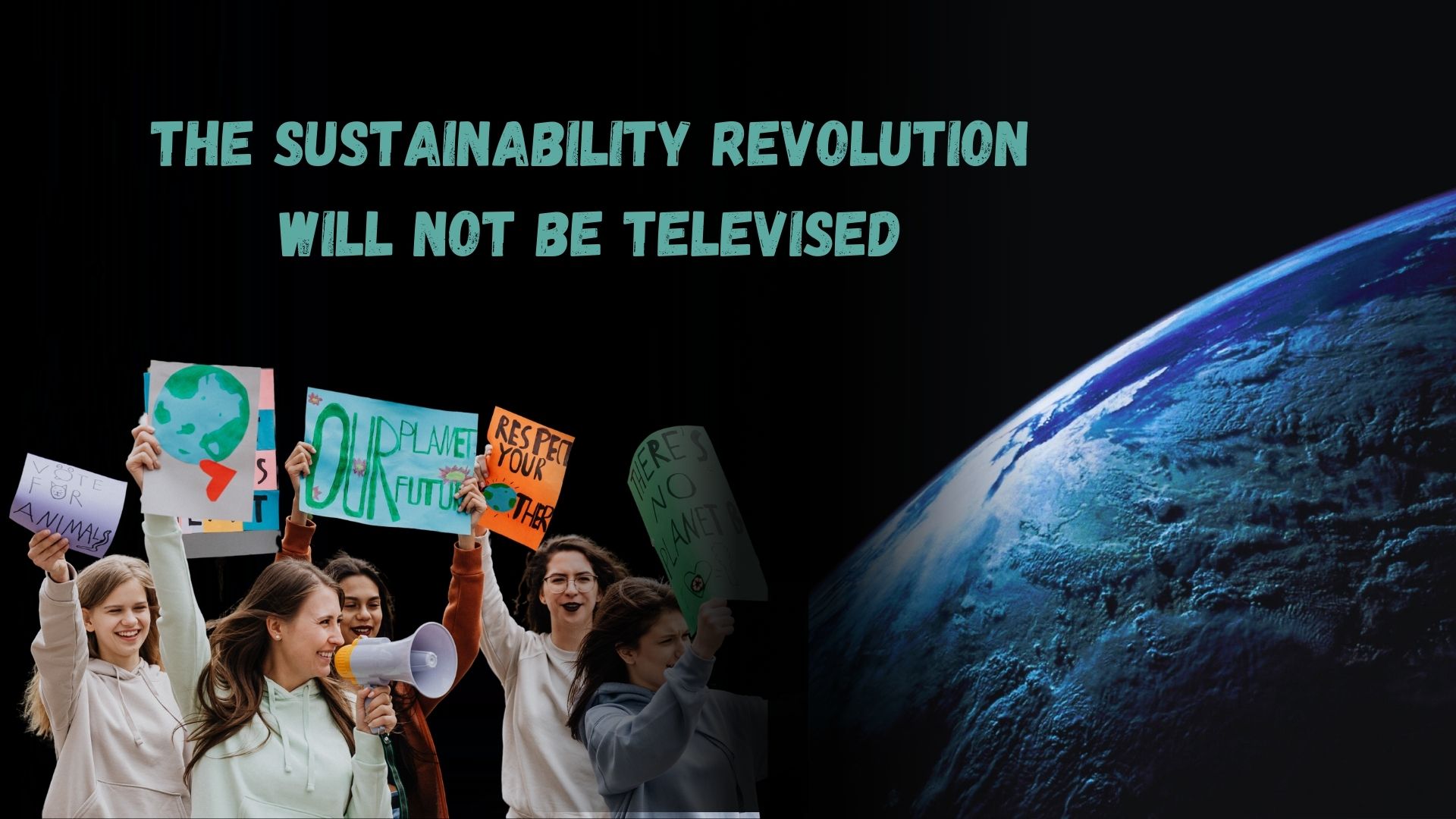
Are we experiencing sustainability as a revolution? In his book “Revolutions: a very short introduction”, Jack Goldstone points out that revolutions arise from a combination of structural and transient factors. Structural causes represent enduring, overarching trends that gradually weaken established social institutions and relationships over the long term. In contrast, transient causes involve specific events or actions by individuals or groups, which serve as catalysts, exposing the effects of these long-term trends and often sparking revolutionary opposition to mobilize for further action. Those structural and transient factors are at play currently.
In his iconic song, “The Revolution Will Not Be Televised”, Gil Scott Heron makes the case that empowerment lies not in corporate promises, but in the revolution of our own minds and actions. Personal action will ultimate drive the big changes society needs for sustainable sustainability. Personal responsibility is less about ESG projects and more about the micro-choices choices we make each day as part of life-as-usual.
Sustainability is a revolution that is not being televised. Institutions will rarely venture too much further than their customers’ demand even if the future fate of the world lies in their hands. Governments can force the action but often they are slow to respond with meaningful regulation. So, the question begs itself, from where will the revolution be driven: business, government or the people. It really is a three-part chicken and egg challenge. Of course, each has their part to play.
Business controls the resources and means of production. They are bound by government regulation but often find ways of skirting around the rules as in greenwashing. The businesses that are ethical and authentic are the ones to watch in the sustainability revolution. These are often start ups solving for a particular challenge in a disruptive way. For example, Fintech Solutions, looks to harness cutting-edge technology and data analytics to equip financial institutions with the resources and intelligence necessary to foster sustainable investment choices. Another example is Krill Design Hailing from Italy, this design startup epitomizes the concept of ” turning trash into treasure.” Producing items like lamps made entirely from orange peels, rendering it fully compostable and championing the circular economy.
Government has the power of laws and penalties but need to be friends of business to keep the current economy on track (or is some places to keep the politicians’ pockets lined). Big governments have power to impact other governments but it is often smaller governments (cities and small countries which enact disruptive laws that advance the sustainable revolution. Examples are Rwanda’s ban on plastic bags and the Spanish city, Pontevedra’s ban on vehicles from the city center. While no government can claim to be perfect, those that display authentic sustainability leadership are experiencing longer term popular support.
At the core business and government need the people’s support. However, the people have the disadvantage of being difficult to organise into a unified force. However, a basic fact is that revolutions don’t start with business or government. They start with the people. The people are catching on. Examples like Greta Thunberg’s “Skolstrejk för klimatet” action and Wangari Maathai’s Green Belt Movement. Activists like these are getting governments and world bodies to pay attention. Business is starting to pay attention as well. For example, Handprint connects companies with consumer demands for sustainability. Through their software, businesses can support causes like habitat preservation and ocean plastics, meeting the expectations of environmentally conscious consumers. Filip Geuens is creating software, “Zeedling” that does something similar for citizens living in a given city.
In the end it’s all about people. We all occupy different concurrent roles: dad, lawmaker, CFO, engineer, etc. For most of us, our varied roles are not perfectly aligned. All the talk about work-life balance, values-based leadership and the importance of shared purpose is indicative of that. For me, the point is how to enable more and more of us to make better balanced life choices in whichever role we prioritise at a given moment. It needs to feel non-threatening in whichever role we are prioritising at that moment. For example, the mom wants to protect the world for her kid but she may make other choices if feels the need to do so in her role as CFO. All of us may be looking at ways to offset decisions/ actions taken in one role with choices made in another.
I am not saying business or govt is wrong but in the end revolution in lifestyle based on sustainability comes from the people. We are approaching a tipping point in social conscious. As Gill Scott Heron’s opening lyrics state:
You will not be able to stay home, brother
You will not be able to plug in, turn on and cop out
You will not be able to lose yourself on skag
And skip out for beer during commercials, because
The revolution will not be televised
The difference is that Gil in 1971 was telling the people that the revolution will not be televised. Now the groundswell is bubbling, and the people are beginning to tell us. This is a fundamental shift in sustainability experience. It’s smart to take heed.